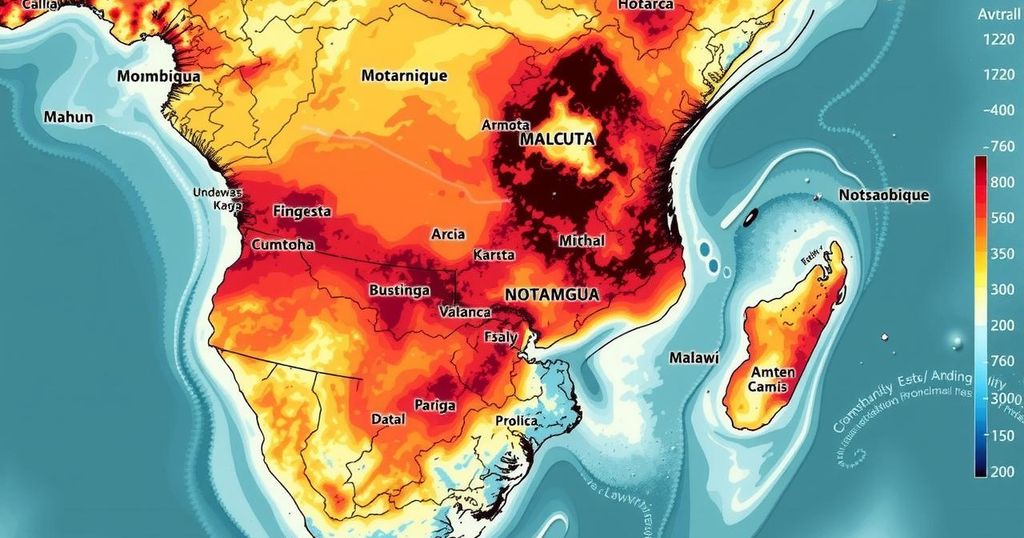Cyclone Chido’s Impact Highlights Climate Challenges in Mozambique and Malawi

Cyclone Chido has severely impacted northern Mozambique and Malawi, displacing thousands and causing significant infrastructural damage. The rise in cyclone frequency is linked to climate change, as emphasized by officials. The humanitarian response highlights immediate and long-term concerns for education and health services, with ongoing assessments of damage and food security challenges. Efforts are underway to improve preparedness against future weather events.
Cyclone Chido has recently caused extensive damage in northern Mozambique, crossing from the Indian Ocean to strike Mozambique and Malawi, following its initial impact on the island of Mayotte on December 15. Thousands have been displaced, particularly in Cabo Delgado and Nampula provinces. The cyclone follows a troubling trend of increasingly severe weather events in Southern Africa, exacerbated by climate change, evidenced by the occurrence of previous cyclones in recent years.
Lucy Mtilatila, Director of Climate Change and Meteorological Services in Malawi, emphasized that rising global temperatures are increasing the frequency of tropical cyclones, mentioning, “Right now, we are seeing that indeed climate change is affecting us. We used to have tropical cyclones affecting Malawi, but it was maybe once in 10 years. But right now, you can see the frequency.”
As Cyclone Chido unleashed winds of up to 260 km/h (160 mph) and significant rainfall, the immediate impacts were tragically felt, with reports of fatalities and extensive infrastructural damage. UNICEF expressed concern not only for the immediate humanitarian crisis but also about the long-term impacts on educational and health facilities, indicating that children may be deprived of education and that there could be an outbreak of diseases due to contaminated water.
Emergency measures are currently in place, with 2,800 individuals sheltered in Pemba. However, the extent of the cyclone’s devastation remains uncertain as authorities struggle to assess damage in remote areas impacted by power outages. Past cyclones have severely affected the region, and local officials remain apprehensive about Cyclone Chido’s potential for worsening food security, as assessments of the agricultural impact are still pending.
Preparedness measures implemented by the Malawian government have shown improvement compared to previous cyclones, with enhanced collaboration among different sectors. Mtilatila noted, “The coordination between national and district-level teams was much stronger than it was when Cyclone Freddy struck.”
Despite these efforts, communities continue to grapple with the consequences of frequent natural disasters. Mtilatila urged for a proactive approach towards climate resilience, emphasizing the importance of long-term planning and infrastructure development. She stated, “Preparedness it’s not only about when the cyclone is about to hit, but it’s how we prepare ourselves when we are planning our settlements, for example.”
In anticipation of such disasters, the Malawian government prepositioned food and supplies, though the nation confronts challenges such as drought and food scarcity, particularly after a poor harvest. Organizations like UNICEF and the World Food Programme are actively involved in relief efforts, but more assistance is critically needed as climate change worsens the frequency of cyclones in the region. Mtilatila concluded, “As we are being impacted by these cyclones, we are learning a lot. So, as we are building back, we do it better so that we should not make ourselves vulnerable.”
The article discusses the recent impacts of Cyclone Chido on Mozambique and Malawi, highlighting the increasing frequency and intensity of cyclones in the southern African region due to climate change. The cyclone has caused significant displacement and damage, paralleling the trends observed in previous years with notable cyclones ravaging the area. The humanitarian response is crucial as communities face immediate and long-term challenges in rebuilding and addressing urgent needs.
In conclusion, Cyclone Chido’s devastating impact on Mozambique and Malawi underscores the growing concern over climate change and its effects on extreme weather patterns in southern Africa. While responses have improved, there remains a pressing need for continued support and proactive measures to enhance community resilience and infrastructure against future disasters. International assistance, along with local preparedness, becomes paramount to address both immediate humanitarian needs and long-term climate adaptation strategies.
Original Source: www.dw.com






